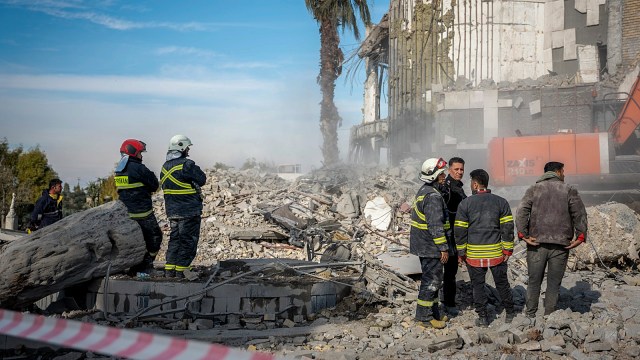As Iran strikes militant group Jaish al-Adl bases in Pakistan, a look at who they are, their past attacks
The group has allegedly been involved in a series of violent attacks in Iran, and has claimed bombings and kidnapped members of Iran's border police in the past
 Emergency services clear the rubble of the house of Peshraw Dizayi that was hit in Iranian missile strikes in Irbil, Iraq, on Tuesday. (Photo: AP)
Emergency services clear the rubble of the house of Peshraw Dizayi that was hit in Iranian missile strikes in Irbil, Iraq, on Tuesday. (Photo: AP)Iran on Tuesday bombed two bases of militant group Jaish al-Adl in Pakistan’s Balochistan province with missiles and drones, although it was yet to specify the reason behind the attack. Two children and three others were said to be wounded in the assault which Pakistan described as an “unprovoked violation” of its airspace.
Islamabad warned that the incident could have “serious consequences” and was “completely unacceptable” in a statement released by Pakistan’s foreign office spokesperson in the early hours of Wednesday.
Who are the Jaish al-Adl?
Jaish al-Adl, literally the “Army of Justice”, are a Sunni Salafist militant group with bases in Pakistan’s Balochistan province, who are active in the mountainous border regions of Pakistan and Iran. They are one of several Sunni militant separatist groups who claim to be fighting for the independence of the Sistan and Baluchestan (known as Asli Balouchestan) province in the southeastern corner of Iran, bordering Pakistan’s Balochistan province and the Indian Ocean.
Jaish al-Adl was founded in 2012, and Iranian officials believe it largely operates in Pakistan.
Their past attacks
The group has allegedly been involved in a series of violent attacks in Iran, and has claimed bombings and kidnapped members of Iran’s border police in the past.
In December, suspected Jaish al-Adl members killed 11 people and wounded eight others in a nighttime attack on a police station in southeastern Iran. Another recent attack killed another police officer in the area. In 2019, Jaish al-Adl claimed responsibility for a suicide bombing targeting a bus that killed 27 members of Iran’s paramilitary Revolutionary Guard. Iran has suspected that Sunni-majority Pakistan is hosting insurgents, possibly at the behest of its regional archrival Saudi Arabia.
However, Iran and Saudi Arabia reached a Chinese-mediated détente last March, easing tensions. Pakistan, meanwhile, has blamed Iran in the past over militant attacks targeting its security forces. It remains unclear why Iran launched Tuesday’s attack, particularly as its foreign minister had met Pakistan’s caretaker prime minister the same day at the World Economic Forum in Davos, Switzerland. After the Islamic State bombings this month, Iran’s Intelligence Ministry alleged the two bombers involved in the attack had travelled from Afghanistan into Iran through its southeastern border at the Jalg crossing — meaning they had traveled through Balochistan.
Balochistan province, as well as Iran’s neighboring Sistan and Baluchestan provinces, have faced a low-level insurgency by Baluch nationalists for more than two decades. They initially wanted a share of provincial resources, but later initiated an insurgency for independence. Iran’s attack on Pakistan came less than a day after Iranian strikes on northern Iraq that killed several civilians. Iraq recalled its ambassador from Tehran for consultations and summoned Iran’s chargé d’affaires in Baghdad on Tuesday in protest. Iran separately struck Syria as well.
- 0118 hours ago
- 0218 hours ago
- 0318 hours ago
- 045 hours ago
- 0519 hours ago































